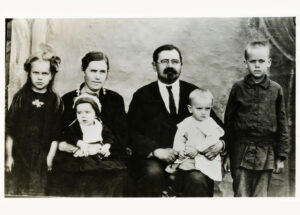Just before Jack McKay* was let out of prison, a local paper ran an article that portrayed him as an unhinged, unreformed sexual predator. The message was blunt: Beware, be afraid.
I wasn’t afraid. But I was somewhat apprehensive as I pulled up to the prison at 8:30 a.m. to pick Jack up on the day he was released. As a retired Mennonite farmer, the thought of assisting a convicted sex offender navigate his first day of freedom in a city and society that was not exactly going to roll out the red carpet was intimidating.
I had met Jack through a Mennonite-affiliated prison visitation program. Although our personal backgrounds could hardly have been more divergent, I had really appreciated getting to know him. Our friendship reminded me of the basic commonality that runs deeper than ethnicity, age or experience with the law. We are all human. We are all loved by God.
About a year before Jack’s release date, I suggested that when the big day arrived I would pick him up at the prison. I thought we could share that special moment. I knew enough of his splintered life story to know that no one else would be making that offer. I was happy to do it. I knew it wouldn’t be like in the movies—sunny elation and tears of joy on the front steps of the prison—but we would have breakfast together, run some errands and then I would take him to the bus depot. His plan was to leave town.
Life does not always work out as planned. I waited a half-hour in the drab prison entrance way. Eventually, Jack walked out with his few belongings. He was happy to get out, but he didn’t even crack a smile. I shook his hand. Neither us of said a lot.
Due to legal developments shortly before his release, he was to have numerous conditions placed on him upon his release, including a travel restriction. This dampened the mood.
I took one of his bags and we walked out the front door into a mild winter day. All his belongings—including a traditional star blanket he had made while in prison—fit comfortably into half the trunk of my car.
I had been given no instructions by prison staff other than that we were to go directly to the probation officer, no stops. Shortly after leaving the prison, Jack said he wanted to get some smokes. I said our orders were clear, and added, as was my Christian duty, that this might be a good time to give up the habit. I hadn’t yet realized how absurd it was to suggest that a guy quit smoking on his first day out of jail. To re-enter society as an indigenous ex-con sex offender comes with enough other challenges.
At the probation office we waited again. When Jack’s turn came up, the officer detailed the stringent stipulations of his probation and the consequences of any failure to comply. Then he sent us off to the Salvation Army shelter to arrange lodging. That was his official welcome back to society.
First we went for our much-anticipated breakfast out. A staff person from the prison visitation program I was part of joined us. We spoke about Jack’s offence history. It was not a topic he had been willing to discuss earlier. I only found out about the nature of his record when I saw the newspaper article prior to his release. Correctional Service Canada (CSC) had subsequently provided the prison visitation program with a copy of Jack’s record. I didn’t read most of it. I knew the basics, but didn’t need the specifics.
To confront a man about horrific crimes from his past is awkward, but in the opinion of CSC Jack had not taken responsibility for his actions and that was something that required attention. Frankly, this isn’t the story of a model prisoner. Jack had once told me about a parole hearing that hadn’t gone well for him: “They say I would be likely to kill someone if they released me,” he scoffed.
I cringed inside, but my friendship was not dependent on him being an ideal inmate. Jack had asked for a visitor and I was there for him.
At breakfast, we also talked about various avenues of assistance that might be available to him and what would be required of him in the process. Jack handled it all well. When asked where his stress level was at on a scale of one to 10, he said two.
After breakfast we went to a thrift store, where Jack quickly acquired a new wardrobe for under $30.
Then off to the Sally Ann. The welcome mat there was a slightly soft layer of cigarette butts outside the front door, where 15 or 20 people huddled, most of them sucking on a cigarette as though their life depended on it.
Inside, we took our place in line. We could have moved up one spot in the queue for the price of a cigarette, but Jack turned down the offer. Then I again found myself on the supposedly dangerous side of bullet-proof glass, talking through a slot, apparently surrounded by would-be assailants. That had also been the case at the probation office earlier, and would be again later at the welfare office.
But our challenges were greater than glass barriers. A person with a history of sexual offence needs to watch his back. A former prison inmate or a relative of a victim may be a potential threat. That’s probably why Jack’s original plan was to leave town.
Given that reality, the idea of sleeping on the floor in an open room with 30 strangers at the shelter was a non-starter for Jack. That became clear when the staff person showed us the room. I couldn’t blame him. He needed privacy, but there was no way they would give him his own room.
The afternoon was wearing on and I was getting worried. Jack announced that his anxiety level was up to nine. As we headed back to the car, he asked with a hint of urgency if he could have a smoke. Without hesitation, I said, “By all means.”
I waited in the car, recalling a study I had read that said tobacco is an effective anxiety-reducing drug, an effective anti-depressant, and, for the really desperate, it holds forth the promise of shortening one’s hellish life. My view towards tobacco use among poor people softened.
I called the probation officer to see about a Plan B, since I didn’t have one. He gave me the list of four hotels, none of them the kind that I would ever consider staying in even in dire circumstances.
We went to the welfare office. Again, there was a room full of people waiting for the important folk sheltered behind the thick glass, and again I was on the helpless, unprotected side. Through a narrow slit, they refused Jack assistance because he had some money in the bank.
Then we went to see the probation officer about Plan C. He wasn’t happy to see us. I asked if the Best Western down the street was acceptable. As long as I paid, it was.
At the hotel desk, they asked for Jack’s address. After a pause, I said he had just come to town. After eight eye-opening hours, we had Jack settled in. I drove back home to the farm, a world away.
By then I felt like I needed a cigarette!
Jack stayed at the Best Western for a couple nights, after which the probation officer got him into a cheaper hotel and eventually into a bedbug-infested rooming house from which he could try to re-launch his life.
During the first year following Jack’s release, I visited him weekly and we talked by phone in between. The visitation program staff also did much to support him. At a gathering of program participants, Jack told the group that without the program he would have breached his probation, or worse.
I was amazed by the fortitude he showed after his release. I was proud of him, and honoured to be part of his life.
When he invited me to a sweat lodge ceremony, I was a bit unsure—huddling in a pitch dark, super-heated tent isn’t quite my thing—but I was honoured by the invitation. Plus, by that point I was becoming accustomed to the unaccustomed. Sweats were part of Jack’s world and I was glad to share this experience.
The right thing to do
A few months after Jack’s release, I heard that Circles of Support and Accountability (CoSA), a non-profit organization that works with men who have histories of sexual offence, was holding training sessions for volunteers. Each such man is surrounded by a circle of staff and volunteers who meet weekly to provide support and accountability. The goal of the program is simple: No new victims.
I thought the training would give me a better understanding of what Jack was going through and perhaps teach me to relate to him in a more helpful way. I also thought that Jack might eventually join CoSA and I wanted to be prepared to be part of his circle if that did happen, which it did.
CoSA is a made up of people who consider it worthwhile to invest time in the lives of people who have offence histories that are, in some cases, downright shocking. They are an intriguing and enriching group to be part of.
And of course it has been enriching to be part of Jack’s journey in this way, as intense as it is at times. I value the opportunity of sharing in the life of someone whose journey has been so different from my own.
There is no fairytale ending to this story. Jack has been unable to get a job, largely because of serious health issues. He continues to live with the anguish of being estranged from his former partner and his children. He still lives in a rooming house. He hasn’t become a medical missionary, motivational speaker or anti-tobacco advocate.
But he has healthy relationships. He hasn’t gone back to jail. His actions have flatly refuted the demonized billing the newspaper gave him at the time of his release. Still, he lives in a society in which open hostility and disdain toward people like him is acceptable.
A Mennonite church-going friend once asked me of my prison visitation: “Does it even do any good?”
That’s the wrong question. I ask instead whether it is the right thing to do. To offer unconditional support and friendship to sexual offenders who have, in most cases, themselves been seriously disadvantaged and victimized, seems like a worthwhile endeavour.
That said, it does indeed do good. Studies show that CoSA programs across Canada—many of which have roots in Mennonite Central Committee—have proven to be a remarkably successful means to keep people from re-offending. Obviously Jack would have been more likely to mess up if he had just been deposited on his own at the front door of the shelter. He once said that if he had had to stay there, he would have breached his probation the first night out.
At other times he phoned when he was on the verge of heading out to drown his sorrows, or worse. He hung on, partly because of his own remarkable resilience, and partly because there were people who refused to treat him as societal trash, to be feared and avoided.
Unfortunately, government funding for CoSA appears shaky. One source of federal funding will dry up at the end of September, and another was abruptly cut and then reinstated under unclear terms recently. (See Evelyn Rempel Petkau’s “CoSA Winnipeg facing funding cuts from all sides” article on page 24.)
I am saddened that a government with plenty of money to spend on incarceration seems to be wavering in its commitment to a program that has proven to reduce the likelihood of re-offence. CoSA is good for people with offence histories, it is good for public safety, and the price tag is very reasonable. The candid discussions and hard-nosed accountability that are worked into CoSA are legitimate and effective ways to be “tough” on crime. But the toughness is within the context of friendship, not fear.
I refuse to look with fear, prejudice or hatred towards people who have been convicted of crimes. They are loved by God. Jack and I, we share a common humanity and a common Creator, and we have come to respect each other. We have become friends.
* In order to honour the privacy of “Jack McKay,” names in this story have been changed, including that of the author, and dates and geographic locations have been omitted.
–Posted March 26, 2014
For reflection and group discussion, go to the discussion questions related to this article.
See also: CoSA: cautious optimism








Leave a Reply
You must be logged in to post a comment.